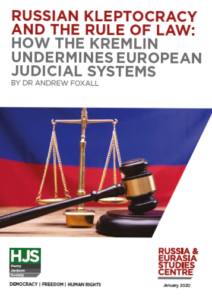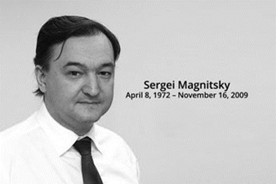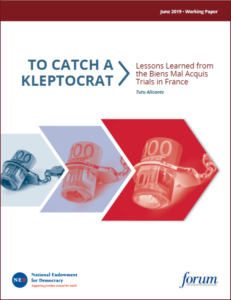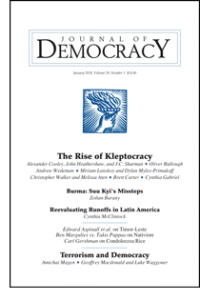 The scale of Russian interference in the English judiciary is such that it now constitutes a “critical national security threat” according to a prominent British lawyer.
The scale of Russian interference in the English judiciary is such that it now constitutes a “critical national security threat” according to a prominent British lawyer.
The observation by Ben Emmerson, QC, appears in the foreword to a new report from the Henry Jackson Society. Russian Kleptocracy and the Rule of Law: How the Kremlin undermines European Judicial Systems concludes that the Kremlin has occasionally “turned [Western] judiciaries into tools of Russian foreign policy”. It adds that “the UK judicial system has a particular importance to Putin and his cronies” and has become “a frontline in Putin’s… campaign against critics and opposition figures”.
The Russian state has placed “blatant lies, forged documents, and utterly implausible explanations” before European courts, says Emmerson, who has represented a number of the Kremlin’s critics in legal proceedings, including Marina Litvinenko, Bill Browder, and the governments of Ukraine and Georgia. The UK government’s responses to this threat “do not begin to go far enough”. he asserts.

Credit ESI
Magnitsky laws advocate Bill Browder echoed his concerns. English courts may not be “able to offer protection [to critics of the Russian state] from Kremlin-backed lawfare,” said the author of the bestselling 2015 memoir, Red Notice: A True Story of High Finance, Murder and One Man’s Fight for Justice.
Russian oligarchs are ‘cleansing’ dirty money, with British law firms acting as ‘pin-striped enablers’, the report adds, citing some 2,441 suspicious activity reports filed by lawyers between 2018 and 2019.
“Commercial disputes in UK courts often involved Russian individuals the source of whose wealth is dubious to say the least,” said Andrew Foxall, the report’s author. “And these disputes provide potential cover for a range of activities many of which have taken place elsewhere in Europe, including money laundering.”
 “While there is broad recognition that the Kremlin seeks to undermine European political systems, there is far less understanding of the extent to which the Kremlin also seeks to undermine European judicial systems,” Foxall writes. “Yet, Russia has undermined the rule of law in European states and multilateral treaty organisations for at least the last decade and in ways that further its own interests. In essence, European courts have, on occasions, become tools of Russian foreign policy.”
“While there is broad recognition that the Kremlin seeks to undermine European political systems, there is far less understanding of the extent to which the Kremlin also seeks to undermine European judicial systems,” Foxall writes. “Yet, Russia has undermined the rule of law in European states and multilateral treaty organisations for at least the last decade and in ways that further its own interests. In essence, European courts have, on occasions, become tools of Russian foreign policy.”
Calling for an urgent policy response, the report recommends:
That the Foreign Affairs Select Committee should hold an inquiry into how Russia abuses the international legal system.
 Enact a statutory duty to issue judges with political guidance on the validity of Russia’s justice system.
Enact a statutory duty to issue judges with political guidance on the validity of Russia’s justice system.
Introduce a “strong presumption” against Russian state entities in cases before the courts. RTWT
Networked transnational kleptocracy is one feature of a new working paper series from the National Endowment for Democracy’s International Forum for Democratic Studies, examining the dynamics and impact of resurgent authoritarian influence in an era of globalization. For more details, visit the Forum’s blog, Power 3.0: Understanding Modern Authoritarian Influence, and its related podcast.







